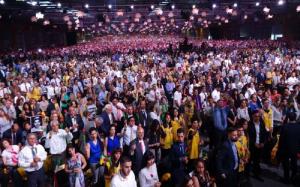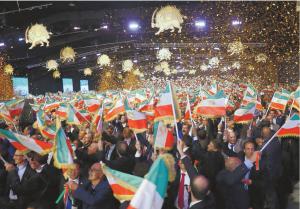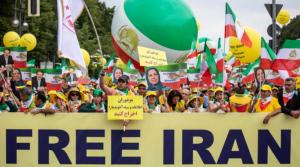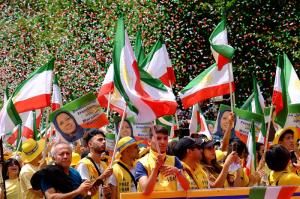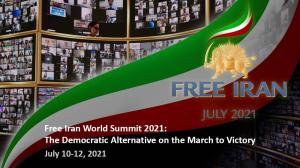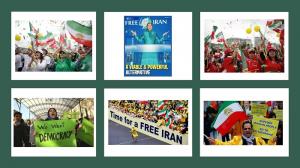(Video) Free Iran 2021: Int’l Community Must Support People’s Call for Regime Change
The Iranian opposition’s president-elect, Mrs. Maryam Rajavi, has long promoted a specific 10-point plan for a free and democratic future Iran.
MEK is part of a coalition known as the National Council of Resistance of Iran, which has long promoted Mrs. Rajavi as the prospective leader of an interim government following the mullahs’ ouster.”
PARIS, FRANCE, July 1, 2021 /EINPresswire.com/ -- On June 18, the people of Iran definitively boycotted the regime’s election farce. The international community should now help them to reject the entire theocratic system underpinning its rule. They can begin to do this by imposing sanctions on the regime’s president and current judiciary chief, Ebrahim Raisi, and by committing to the collective diplomatic isolation of his government. Policymakers have ample justification for these and other actions because Raisi is a well-known violator of human rights, and because the process that brought him to power was an election in name only, and served only to enforce the will of a dictator. — NCRI
Since the beginning of 2018, the Iranian people have repeatedly banded together in great numbers to explicitly call for the ouster of that dictator and the dismantling of the system which grants him absolute authority over all matters of state in Iran. In January of that year, more than 100 Iranian cities and towns took part in a nationwide uprising with the People’s Mojahedin Organization of Iran (PMOI/MEK) on its frontline.
Mrs. Maryam Rajavi, the President-elect of the National Council of Resistance of Iran (NCRI), has long promoted a specific 10-point plan for a democratic future in the country, and the uprising showcased a level of popular support for that plan which regime authorities had always insisted did not exist.
In 1988, the regime’s founder Ruhollah Khomeini declared the MEK and other dissident groups guilty of “enmity against God,” and directed his subordinates to execute members en masse in an effort to stamp out organized dissent.
The ensuing massacre killed over 30,000 people over just a few months but failed to destroy the PMOI. Nevertheless, between then and 2018, the regime always insisted that nothing remained of the chief opposition other than a weak and unpopular “grouplet.”
This propaganda promptly evaporated in the face of the uprising, with the regime’s Supreme Leader Ali Khamenei delivering a speech while it was in full swing and declaring that the MEK had “planned for months” to facilitate unrest on such a grand scale. That unrest was ultimately forced back underground following thousands of arrests and dozens of killings, a number of which were carried out via torture. But afterward, regime authorities continued to warn one another in speeches and public statements about the threat posed to their hold on power by the organized, pro-democracy Resistance movement.
Today’s MEK is part of a coalition known as the National Council of Resistance of Iran, which has long promoted Mrs. Rajavi as the prospective leader of an interim government following the mullahs’ ouster. Each year, her 10-point plan is presented anew to the international community in the context of a gathering of Iranian expatriates and political supporters from across Europe, the United States, and the world at large.
The latest such event is scheduled to take place between July 10 and 12 under the title of “Free Iran World Summit.” As with last year’s event at the height of the coronavirus pandemic, speeches will be live-streamed to separate gatherings of Iranian expatriate communities in various countries, as well as reaching citizens of Iran via a satellite television broadcast.
The Iranian people’s direct connection to the summit is important in any year, but uniquely so in the immediate aftermath of the June sham “election” that brought Raisi to power. That population has just staged the most successful electoral boycott in the 42-year history of the mullahs’ regime, and its participants will no doubt be watching closely for signs of international support for their effort to deprive the clerical regime of political legitimacy both at home and abroad.
Unfortunately, that support has been relatively slow in coming, but the freedom-loving people will no doubt use the forthcoming summit to reassure the Iranian people that they have advocates abroad who are pushing for more assertive policies regarding the clerical regime.
Those policies are already long overdue, but they are especially imperative now that Ebrahim Raisi is poised to assume the leadership of the government. Figures like the outgoing President Hassan Rouhani offer not offered any realistic hope of reform, but Raisi’s presidency would raise the possibility of further escalation of Tehran’s foreign terrorism and domestic human rights abuses.
In 1988, Raisi was a key figure in the “death commission” that oversaw the mass execution of MEK members and other political prisoners in the Iranian capital. In 2019, as judiciary chief, he played a leading role in the crackdown on a nationwide uprising that rekindled the message of public support for regime change which had previously been expressed in the January 2018 protests.
The second uprising proved to be even larger and more spontaneous than its predecessor, encompassing nearly 200 localities almost immediately. The regime’s brutal response was just as immediate, with shooting incidents killing 1,500 people in a matter of days before 12,000 were arrested and subjected to torturous interrogations over a period of months.
With Raisi’s legacy thus spanning practically the entire history of the regime in Iran, it should have come as little surprise when the overwhelming majority of the Iranian people rejected his presidential candidacy and the entire underlying system by boycotting the June 18 sham election. Even regime authorities acknowledged historically low turnout, though they attempted to preserve some semblance of legitimacy by staging crowded scenes at a key Tehran polling place and inflating statistics in order to suggest that about half of the population still supports the existing power structure.
But the work of hundreds of independent journalists indicates that polling places largely remained empty on Election Day and that fewer than one in ten eligible voters cast ballots. Such a comprehensive boycott is an unmistakable repudiation of the ruling system, and Western powers should also understand it as a loud appeal for foreign assistance in the coming conflict with the Raisi government and the regime as a whole.
As much as a month before the election, the Iranian Resistance was predicting that a successful electoral boycott would set the stage for yet another uprising, which would dwarf the scale of those that took place in 2018 and 2019. In the brief time since the sham election concluded, there have been numerous instances of public unrest, including labor strikes that now include thousands of workers representing more than 60 different companies just in Iran’s oil and petrochemical sectors.
Such protests are sure to expand and accelerate as the NCRI demonstrates that Iran’s domestic population has an international base of support and an alternative government waiting in the wings for the day when the mullahs’ are finally overthrown. The international community should put pressure on Raisi and others over the historical human rights abuses and their emerging plans to crack down even harder on dissent at this time of unprecedented crisis for the Iranian regime.
Shahin Gobadi
NCRI
+33 6 50 11 98 48
email us here
Visit us on social media:
Facebook
Twitter
Raisi, Butcher of 1988 Massacre in Iran
Legal Disclaimer:
EIN Presswire provides this news content "as is" without warranty of any kind. We do not accept any responsibility or liability for the accuracy, content, images, videos, licenses, completeness, legality, or reliability of the information contained in this article. If you have any complaints or copyright issues related to this article, kindly contact the author above.

